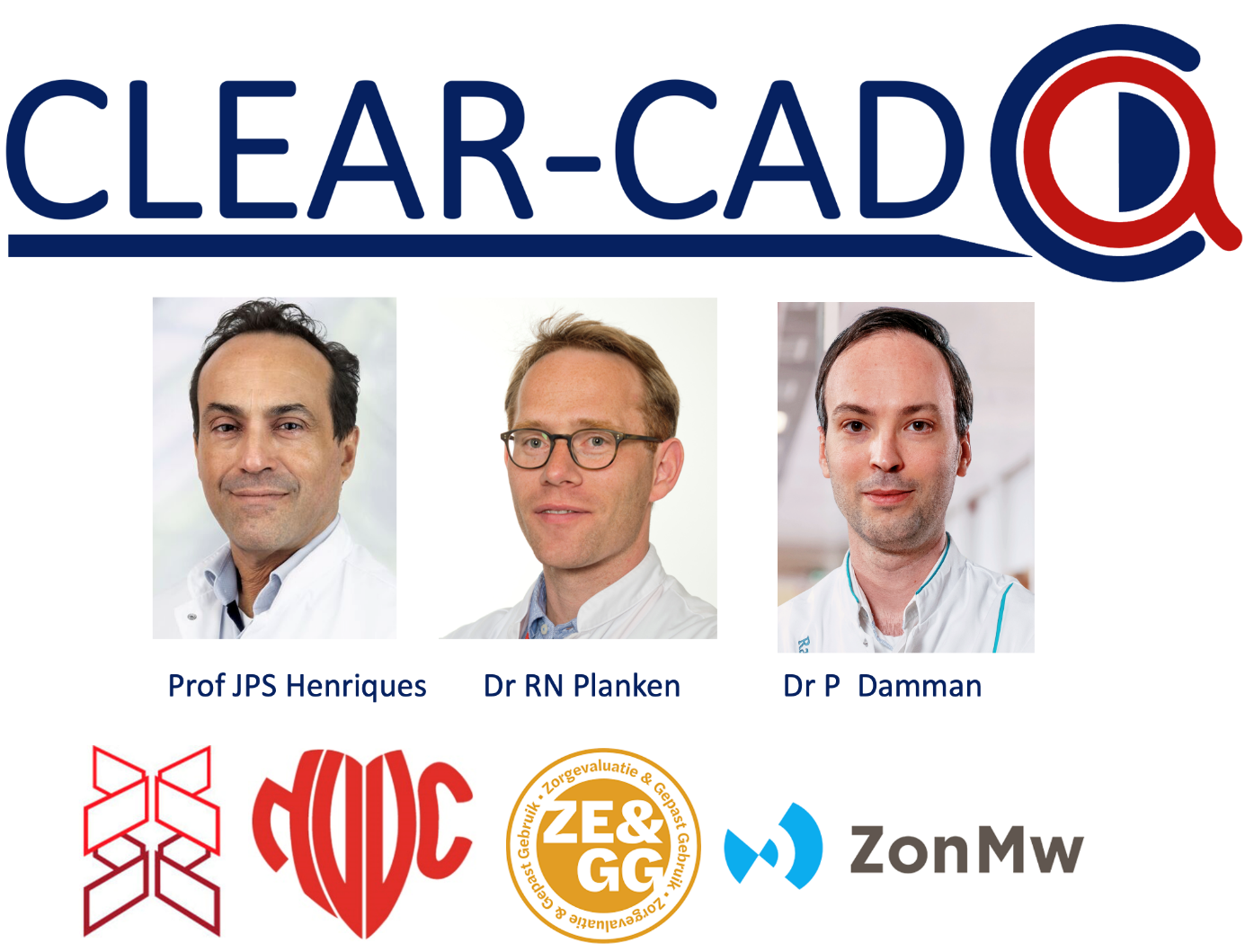CLEAR-CAD trial
CLinical outcomes and cost-Effectiveness of a diAgnostic and tReatment strategy of upfront CTCA plus selective non-invasive functional imaging compared with standard care in patients with chest pain and suspected Coronary Artery Disease: CLEAR-CAD trial
The Dutch national healthcare costs for coronary artery disease (CAD) amounted 2.4 billion euros in 2015 and are expected to increase to 4.2 billion euros in 2030 (Zorginstituut Nederland). Currently, the usual diagnostic strategy includes a variety of echocardiography, anatomical imaging, functional imaging and exercise testing, and varies and includes symptom provocation and ischemia detection, and invasive coronary angiography. Despite these tests, many patients with chest pain due to CAD are misdiagnosed with non-cardiac chest pain and account for one third of patients who subsequently endure a myocardial infarction (Sekhri N, et al. Heart, 2007). The upfront use of CTCA (computed tomography coronary angiography; a non-invasive imaging technique) increased the frequency and certainty of CAD diagnosis in the SCOT-HEART trial, due to improved detection of both non-obstructive and obstructive CAD. The subsequent targeted treatment with preventive pharmacotherapy resulted in a significant reduction of myocardial infarctions at 5 year follow-up (Newby D, et al. Lancet, 2015; Newby D, et al. NEJM, 2018). However, the addition of an upfront CTCA led to a higher number of total diagnostic tests and resulted in higher direct healthcare costs.
Since the publication of SCOT-HEART, the ISCHEMIA trial has shown that optimal medical therapy in patients with obstructive CAD and proven ischemia was non-inferior to an early invasive strategy (Spertus JA, et al. NEJM, 2020). Therefore, we hypothesize that a diagnostic strategy consisting of CTCA to detect CAD and initiate optimal medical therapy (OMT), with angiography (and revascularisation) only in patients with refractory angina and proven ischemia by functional imaging, will result in superior clinical outcomes and reduced healthcare costs.

A randomised clinical multicentre trial in the Netherlands
The CLEAR-CAD will be a randomised clinical multicentre trial in the Netherlands comparing a staged, uniform diagnostic with upfront CTCA and subsequent treatment (intervention) with usual care in patients with suspected CAD.
The intervention consists of upfront CTCA. Based on CTCA, patients are categorized into three groups: (1) no CAD, (2) non-obstructive CAD and (3) obstructive CAD. Patients without CAD can be reassured. In the second group, patients will be treated with preventive OMT. In the third group, patients will be treated with preventive and anti-anginal medication. If chest pain persists, patients will undergo additional non-invasive functional imaging for detection of myocardial ischemia. Only patients with substantial myocardial ischemia on non-invasive functional imaging will then undergo CAG with a direct option for revascularization. A minority of patients in whom specific anatomically high-risk lesions (left main lesion >50% and or proximal LAD lesion >70%) are detected on CTCA, will be referred directly to CAG with option for revascularization. Usual care will be according to the treating physicians, currently characterised by a diversity of invasive and non-invasive diagnostics.
The trial is designed to demonstrate superiority on clinical outcomes at 3-year follow-up, and superiority with regards to cost-effectiveness. Secondary outcomes will include anginal complaints. In order to demonstrate superiority with regard to clinical outcomes, around 6500 patients will be included.
CLEAR-CAD is designed by a collaboration of experts, and members of the Dutch Societies of Cardiology, Radiology, Nuclear Medicine and Thoracic Surgery. It will be one of the largest trials on the diagnostic and treatment pathway in suspected CAD, and we expect the result to drive the recommended care in CAD. We expect to start patient inclusion in 2022.
About the program
The 'Zorgevaluatie en Gepast Gebruik' (ZE&GG) is a joint initiative of all parties of the 'Hoofdlijnenakkoord' (HLA) for medical specialist care (healthcare providers, healthcare insurers, patients and government). The aim of this program is to realise appropriate use of care.

